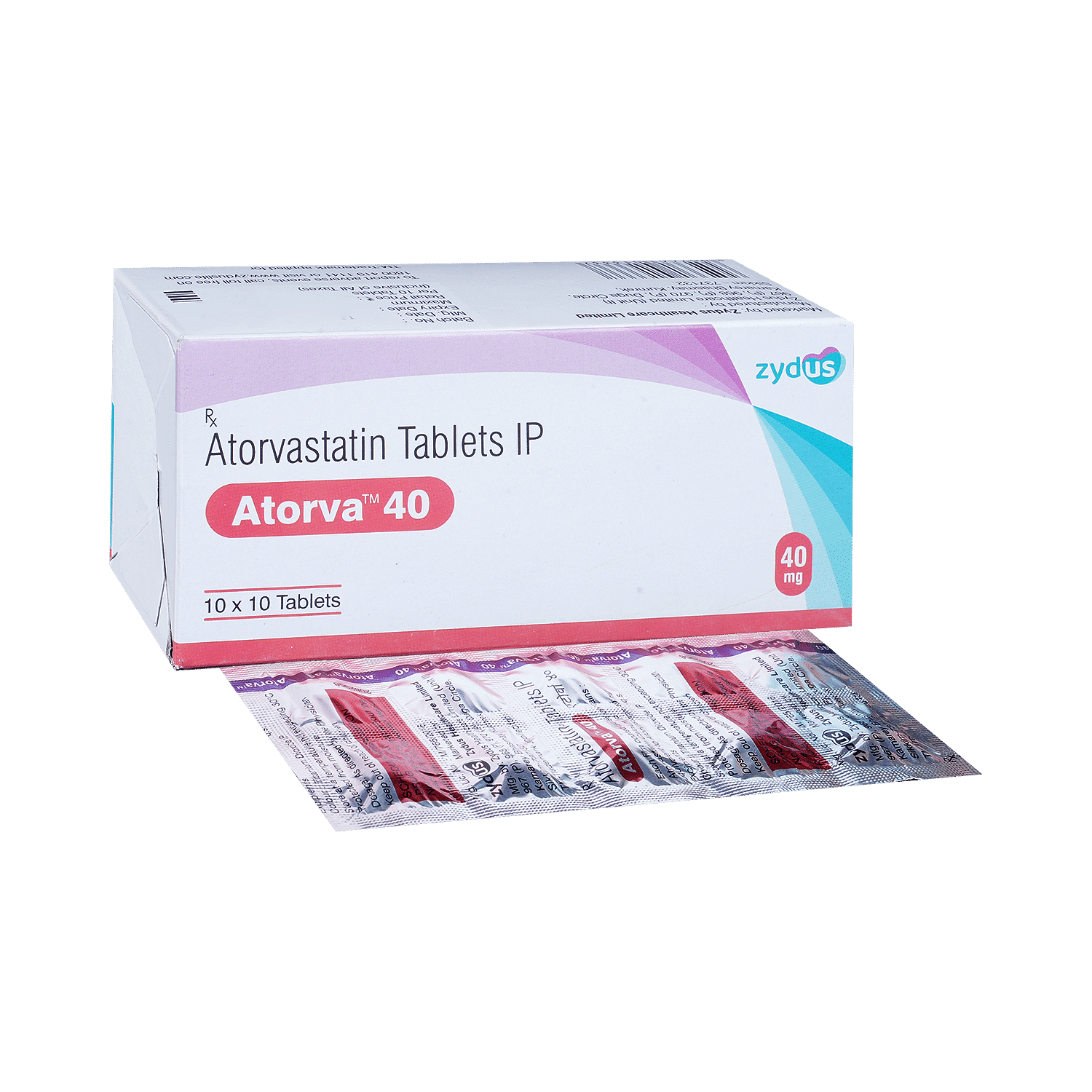
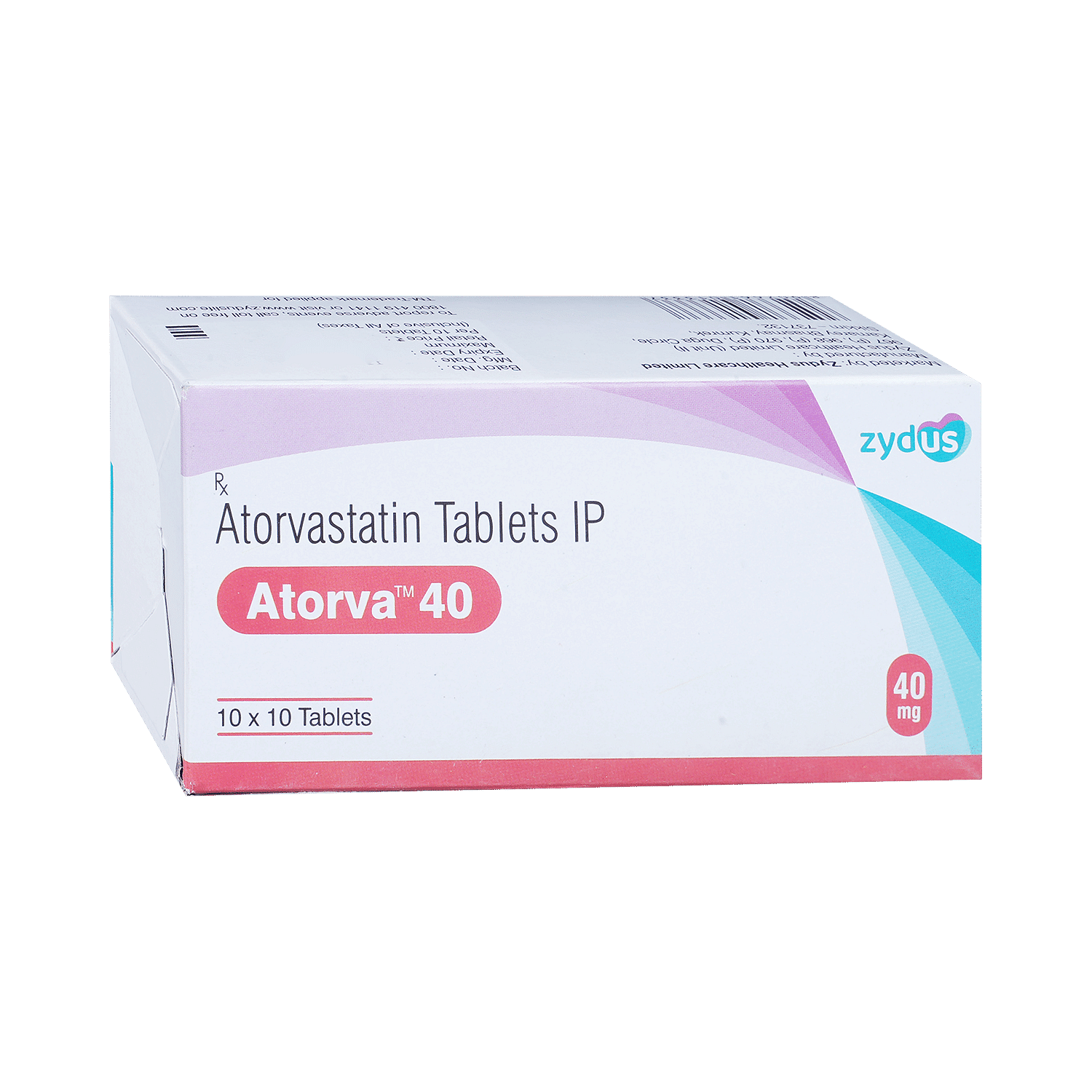
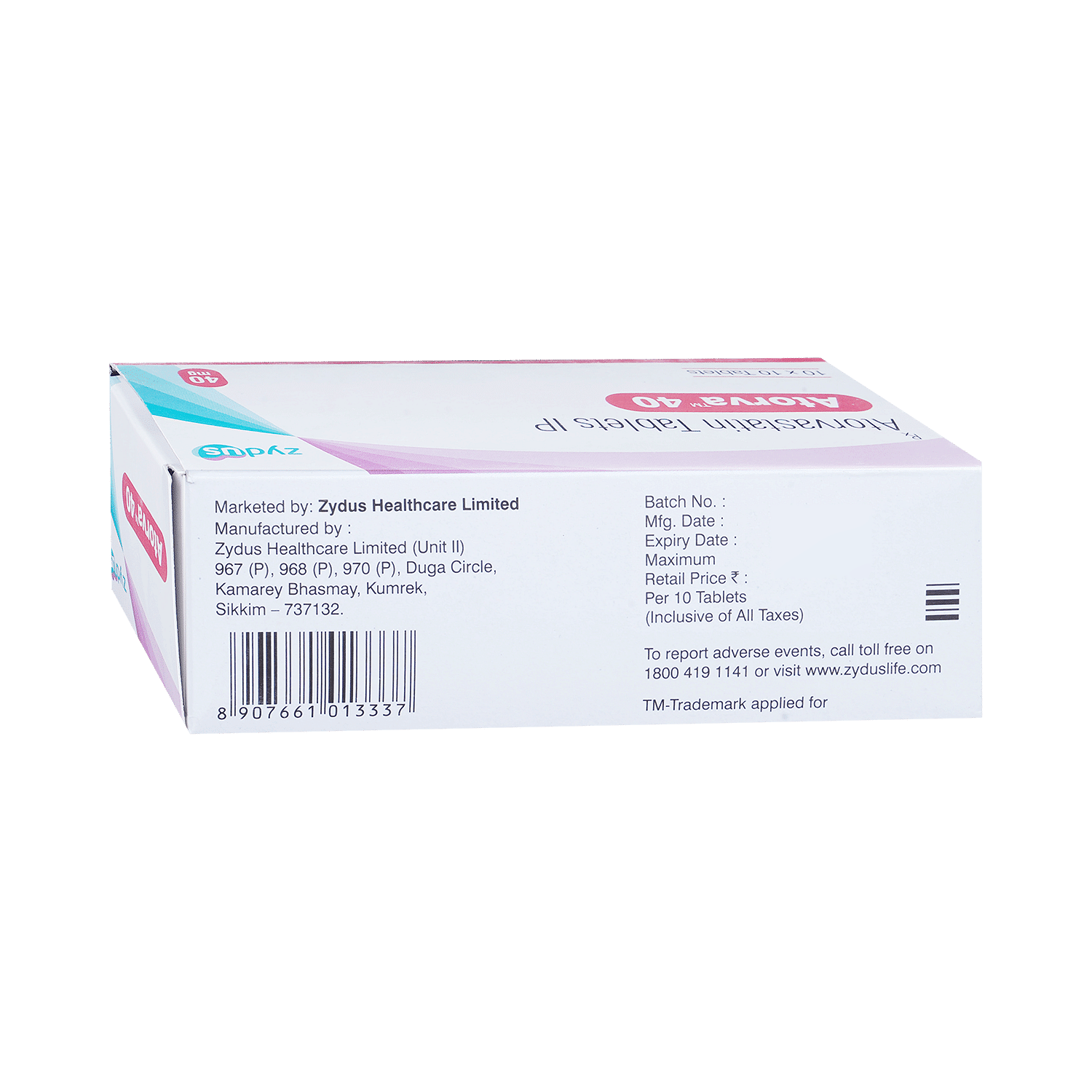
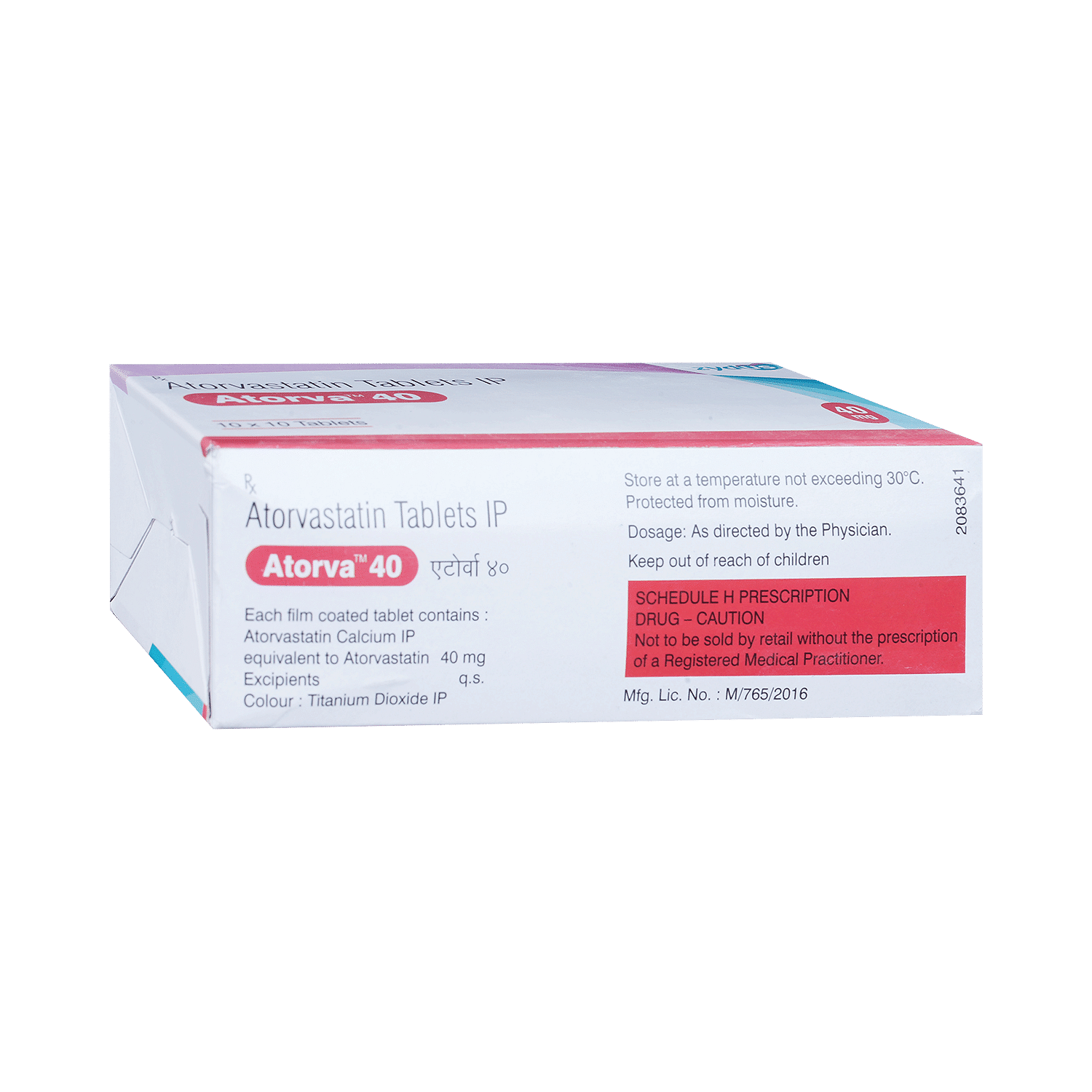
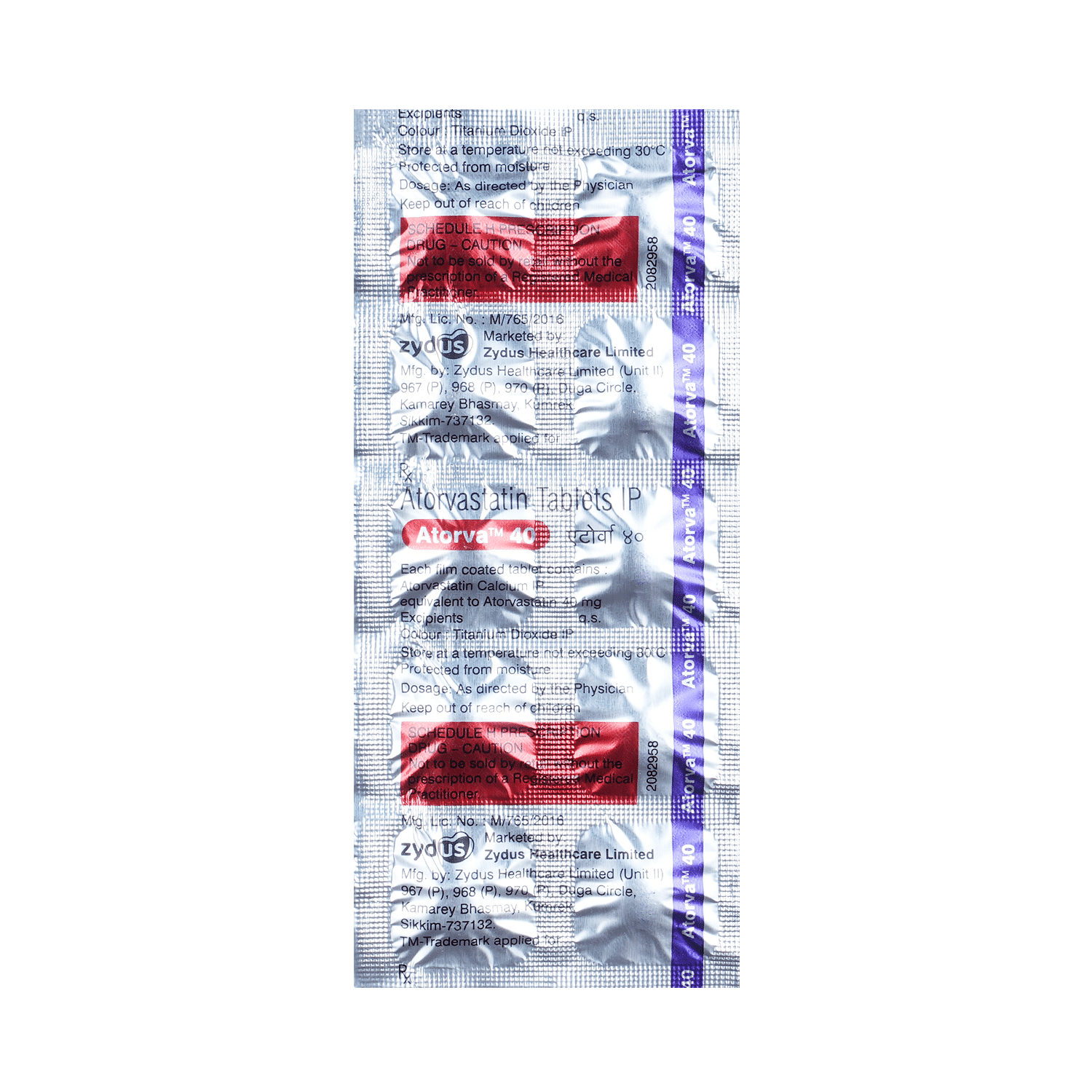

Atorva 40 Tablet
Manufacturer
Zydus Cadila
Salt Composition
Atorvastatin (40mg)
Key Information
Short Description
Atorva 40 Tablet belongs to a group of medicines called statins. It is used to lower cholesterol and to reduce the risk of heart diseases.
Dosage Form
Tablet
Introduction
Atorva 40 Tablet is a widely prescribed medicine and is regarded as safe for long-term use when taken as per the doctor's advice. It can be taken with a meal or on an empty stomach. You can take it at any time of the day but try to take it at about the same time each day. Most people with high cholesterol do not feel ill but stopping your medicine may increase your cholesterol levels thereby increasing your risk of heart disease and stroke.
Directions for Use
Take this medicine in the dose and duration as advised by your doctor. Swallow it as a whole. Do not chew, crush or break it. Atorva 40 Tablet may be taken with or without food but it is better to take it at a fixed time.
Safety Information
Side Effects
Constipation Flatulence Dyspepsia Abdominal pain
Alcohol Warning
Caution is advised when consuming alcohol with Atorva 40 Tablet. Please consult your doctor.
Breastfeeding Warning
Atorva 40 Tablet is unsafe to use during breastfeeding. Data suggests that the drug may cause toxicity to the baby.
Pregnancy Warning
Atorva 40 Tablet is highly unsafe to use during pregnancy. Seek your doctor's advice as studies on pregnant women and animals have shown significant harmful effects to the developing baby.
Interacting Medicines
Amiodarone Amlodipine Azithromycin Benidipine
How it works
Atorva 40 Tablet is a lipid-lowering medication (statin). It works by blocking an enzyme (HMG-CoA-reductase) that is required in the body to make cholesterol. It thus lowers 'bad' cholesterol (LDL) and triglycerides, raising the level of 'good' cholesterol (HDL).
Quick Tips
Inform your doctor if you experience fatigue, muscle weakness or muscle pain. Take it with food if you experience diarrhea, gas or an upset stomach. Inform your doctor if you notice signs of liver problems such as stomach pains, unusually dark urine or yellowing of skin or eyes.
Related Medicines
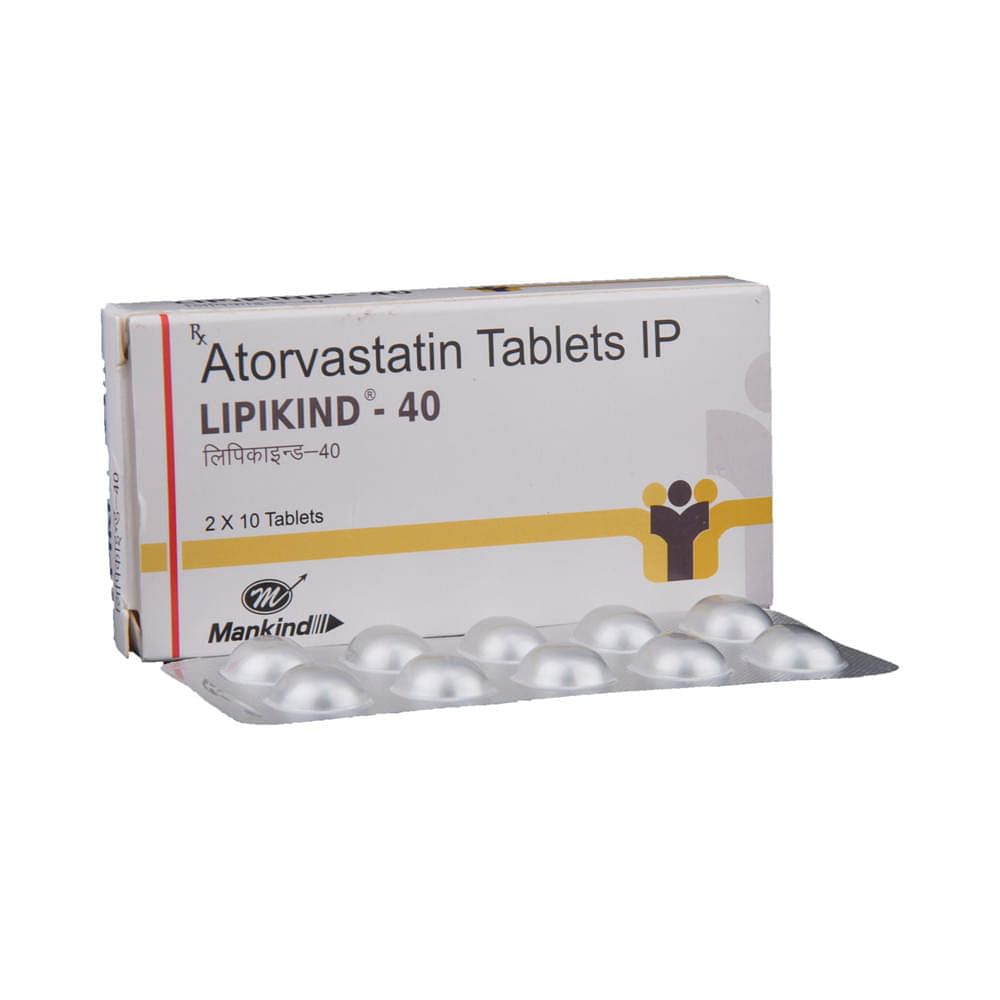
Lipikind-40 Tablet
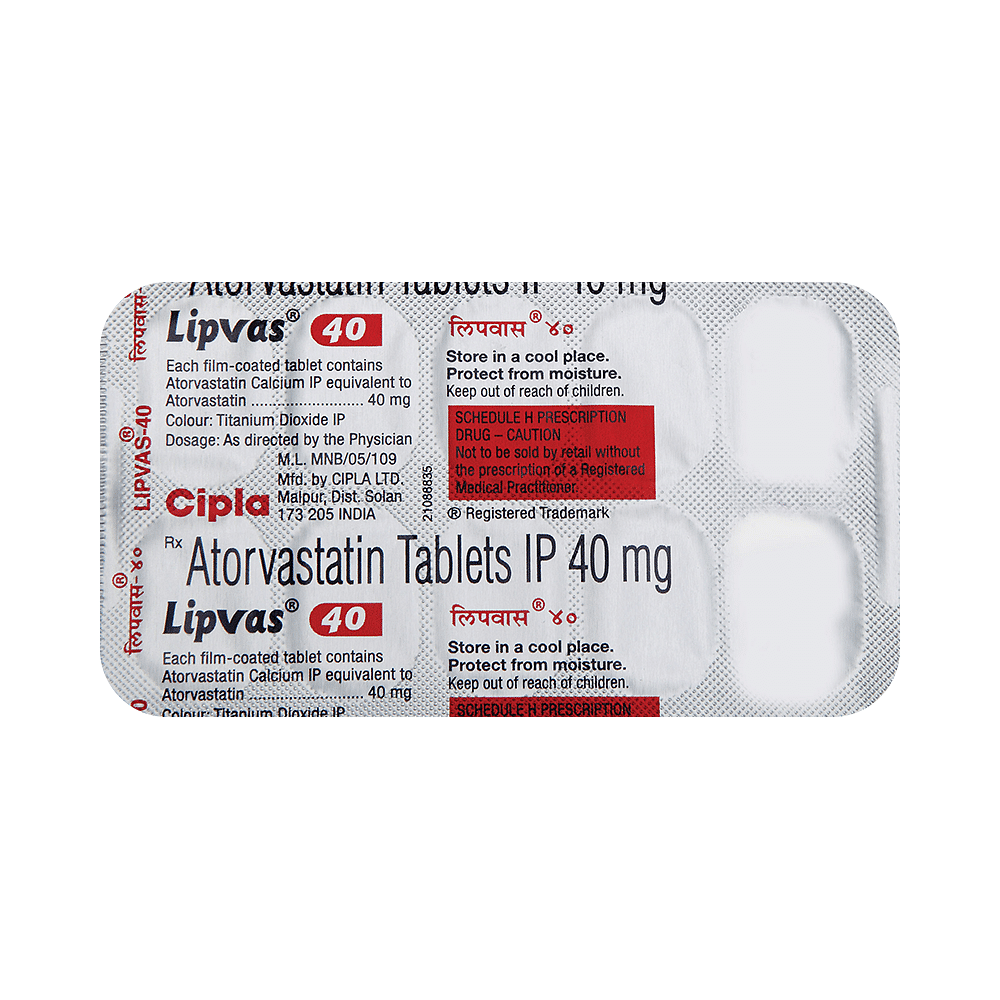
Lipvas 40 Tablet
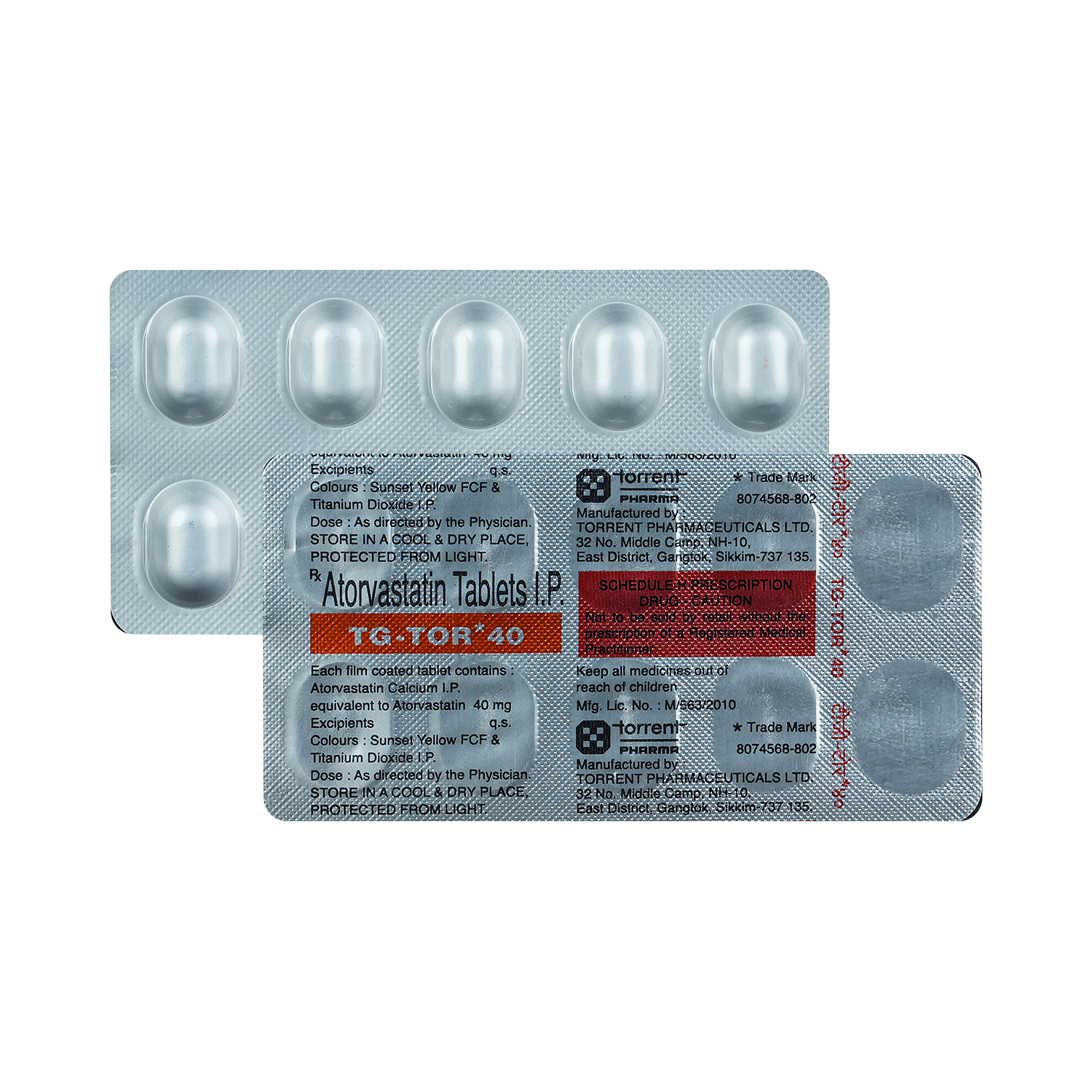
TG-Tor 40 Tablet
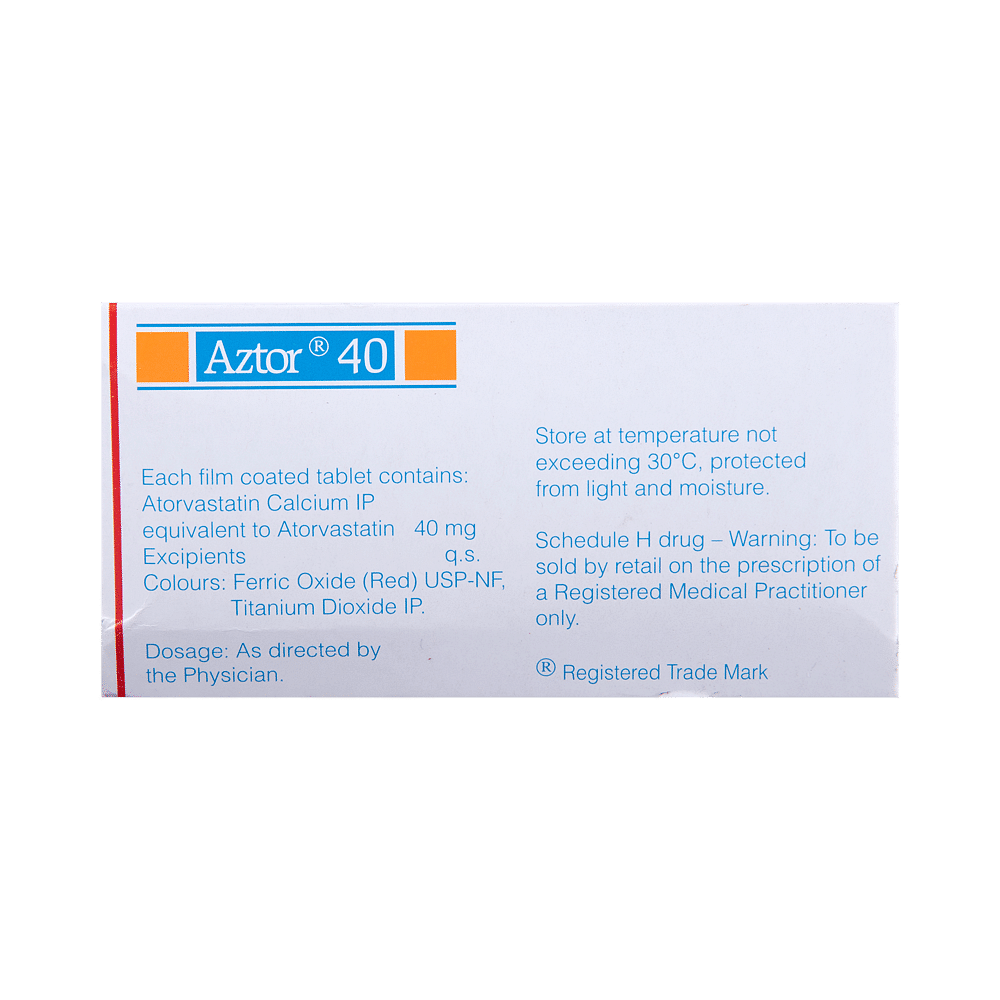
Aztor 40 Tablet
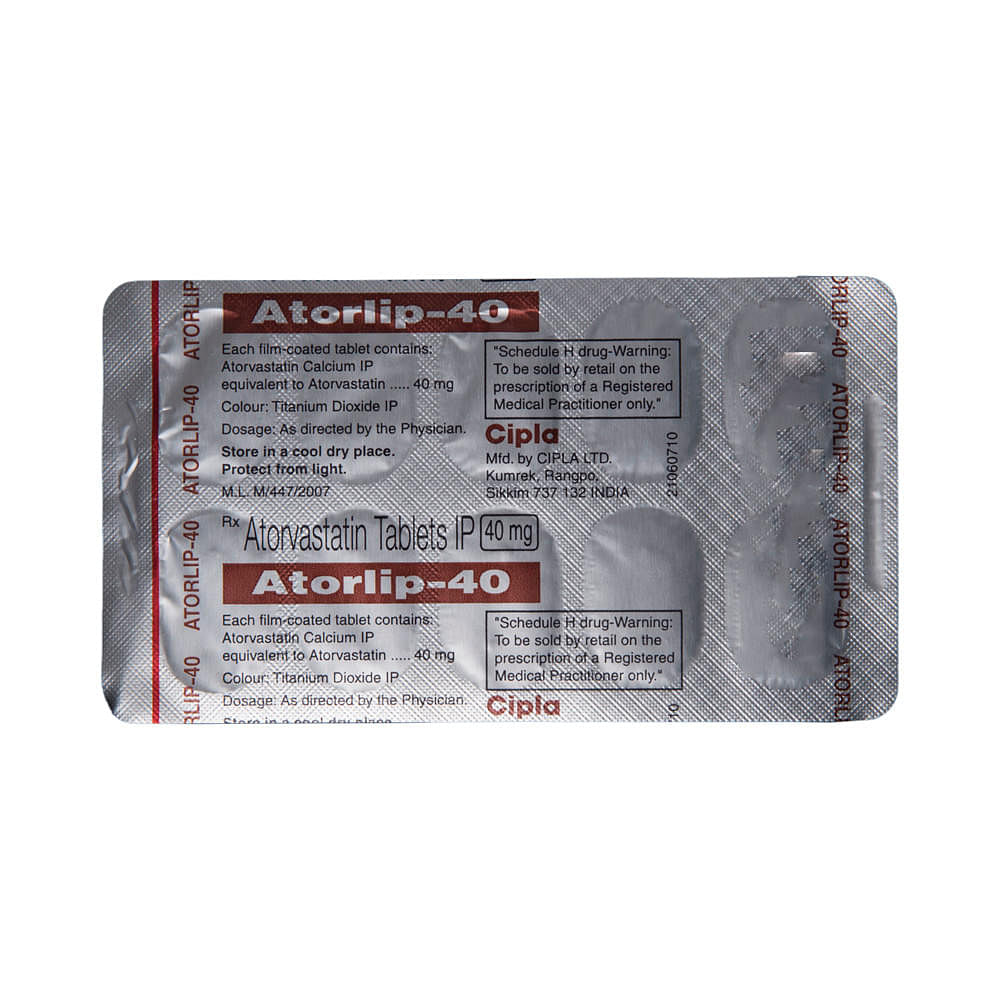
Atorlip-40 Tablet

Atorsave 40 Tablet
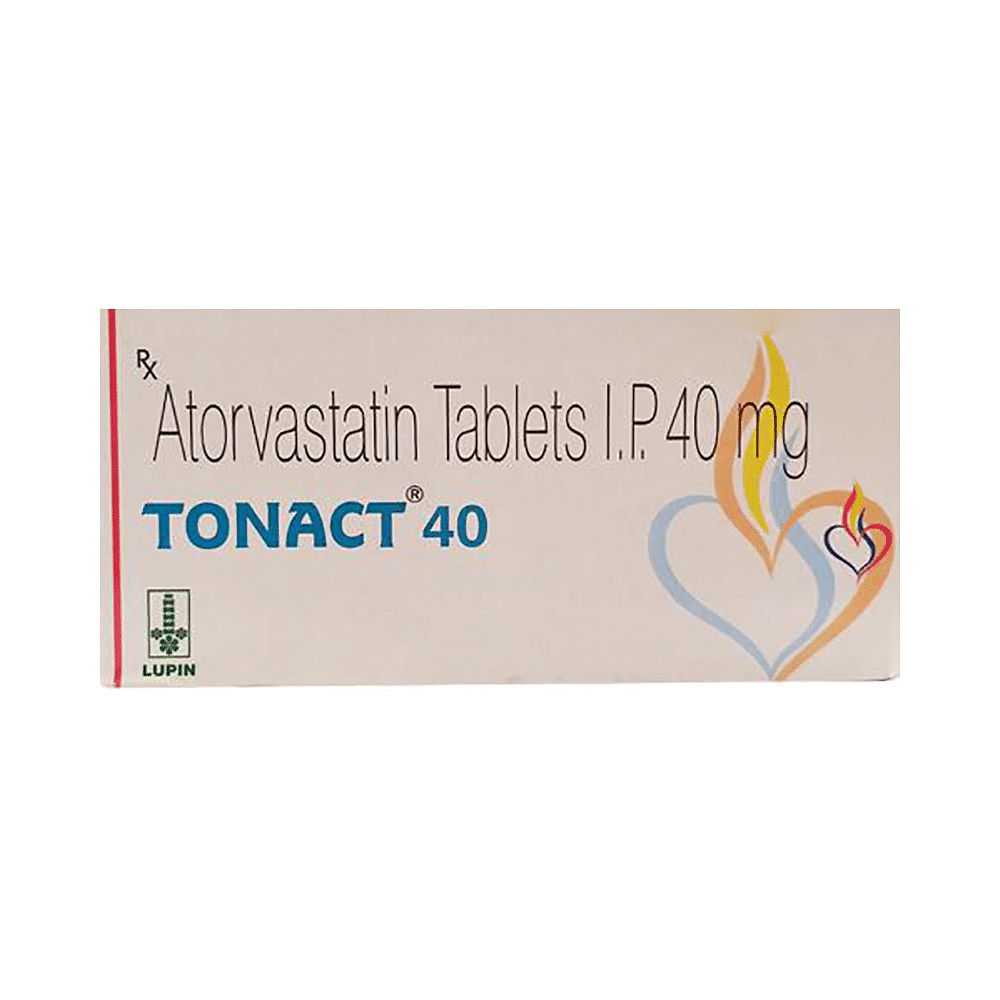
Tonact 40 Tablet
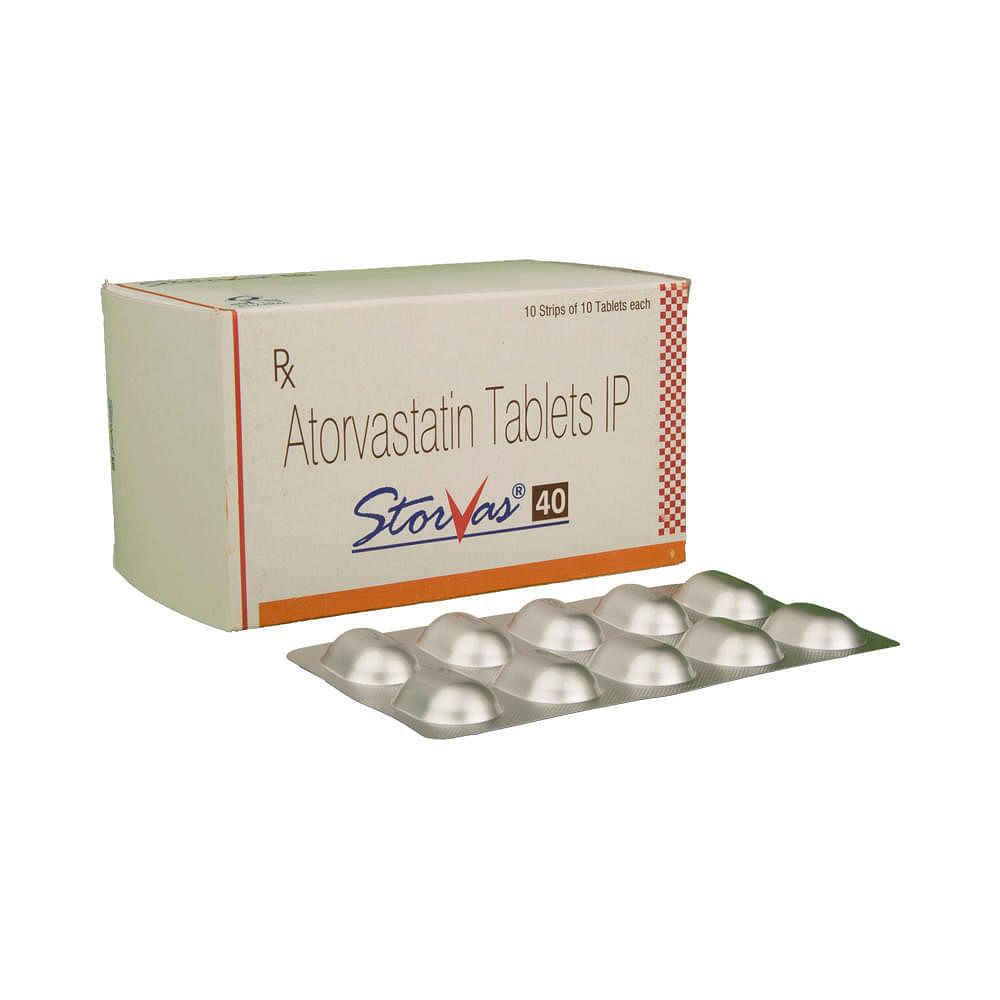
Storvas 40 Tablet
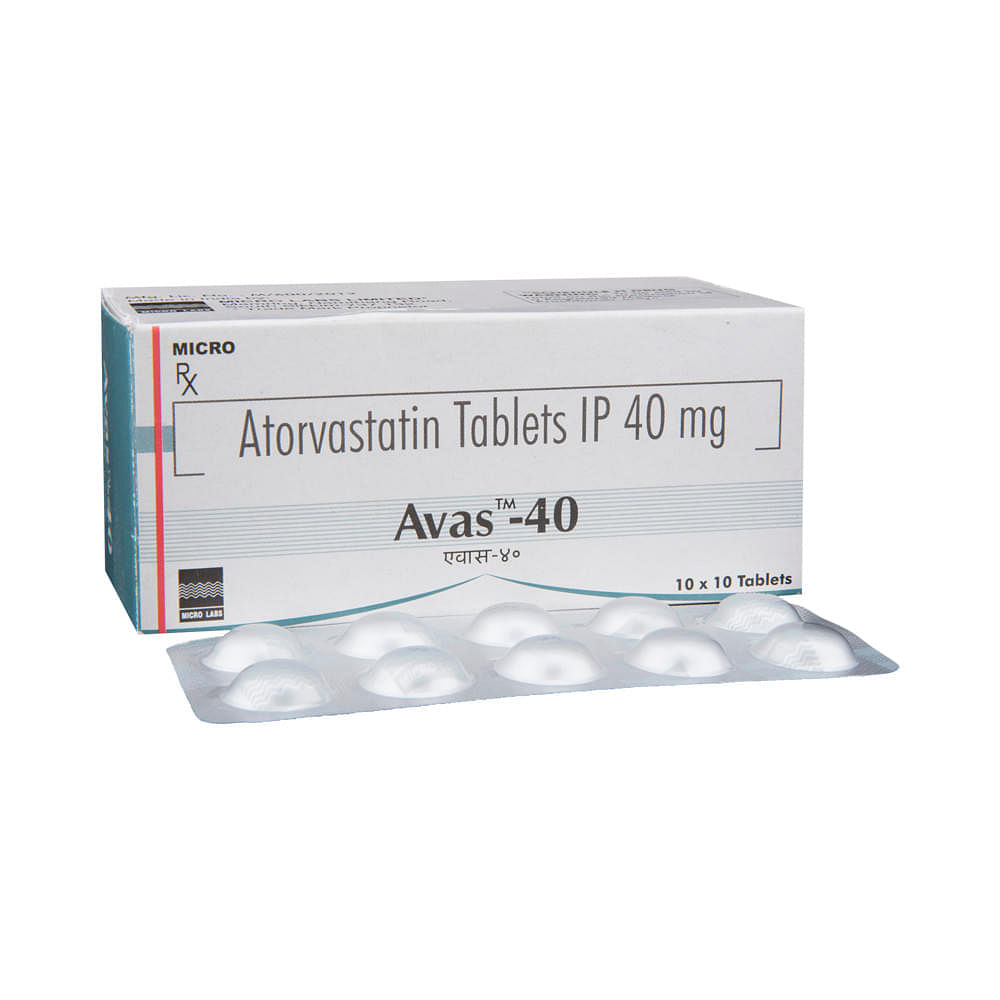
Avas-40 Tablet
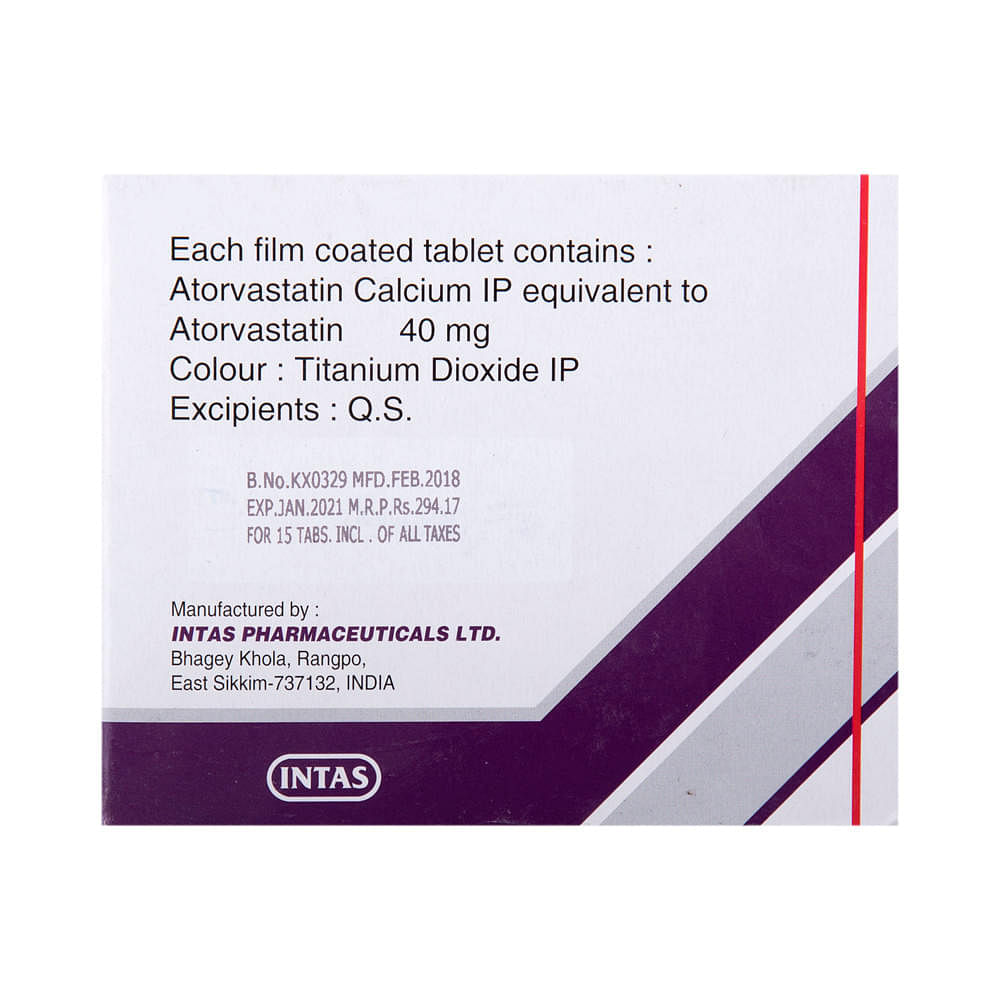
Lipicure 40 Tablet
Frequently asked questions
What should I know about high cholesterol?
High cholesterol is a condition where there is an excessive amount of cholesterol in the bloodstream. It is essential to understand that high cholesterol can lead to the buildup of plaque in the arteries, increasing the risk of heart disease, stroke, and other cardiovascular conditions. Maintaining a healthy lifestyle, including a balanced diet and regular exercise, can help manage cholesterol levels. However, if you have high cholesterol, your doctor may recommend medication, such as Atorva 40 Tablet, to help lower your cholesterol levels.
Can Atorva 40 Tablet cause muscle problems or muscle injury?
Yes, taking Atorva 40 Tablet can cause muscle problems or muscle injury. This is because the medication can reduce oxygen supply to muscle cells, leading to fatigue, muscle pain, tenderness, or muscle weakness. If you experience muscle soreness or weakness while taking Atorva 40 Tablet, consult your doctor to discuss ways to prevent and manage these side effects.
Is Atorva 40 Tablet used for lowering cholesterol?
Yes, Atorva 40 Tablet is a cholesterol-lowering medication that belongs to the statin family. It is used to lower lipid levels, including cholesterol and triglycerides, in the blood when a low-fat diet and lifestyle changes are not enough. Atorva 40 Tablet can also be used to reduce the risk of heart disease in individuals with high cholesterol levels or those at increased risk of heart disease, even if their cholesterol levels are normal.
Can Atorva 40 Tablet be prescribed to children?
Atorva 40 Tablet is approved for use in adults and children aged 10 years or older whose cholesterol levels do not respond to diet and exercise. It is not recommended for use in children under the age of 10.
Is Atorva 40 Tablet a blood thinner?
No, Atorva 40 Tablet is not a blood thinner. It is a cholesterol-lowering medication that works by slowing down the production of cholesterol in the body, which helps to lower the risk of heart disease and stroke.
Will taking Atorva 40 Tablet lead to an increase in my risk of diabetes?
Taking Atorva 40 Tablet may increase the risk of developing type 2 diabetes, especially in individuals who are already at high risk. If you have type 2 diabetes, your doctor may recommend monitoring your blood sugar levels more closely while taking Atorva 40 Tablet.
For how long do I need to take Atorva 40 Tablet? Is it safe for long-term use?
You may need to take Atorva 40 Tablet for the duration prescribed by your doctor, which may be lifelong. The benefits of taking Atorva 40 Tablet will only continue as long as you take the medication. If you stop taking Atorva 40 Tablet without starting a different treatment, your cholesterol levels may rise again. Atorva 40 Tablet is considered safe and has few side effects when taken as directed.
Does Atorva 40 Tablet cause weight loss?
No, Atorva 40 Tablet has not been reported to cause weight loss. However, weight gain has been reported as an uncommon side effect. If you experience weight loss or gain while taking Atorva 40 Tablet, consult your doctor to discuss any concerns you may have.
Can I stop taking Atorva 40 Tablet?
No, you should not stop taking Atorva 40 Tablet without consulting your doctor. If you experience side effects while taking Atorva 40 Tablet, your doctor may recommend adjusting your dosage or switching to a different medication.
Can I take alcohol with Atorva 40 Tablet?
No, it is not recommended to take alcohol while taking Atorva 40 Tablet. Drinking alcohol while taking this medication can increase the risk of liver problems and worsen side effects such as muscle pain, muscle weakness, and tenderness. Individuals with liver problems should consult their doctor before taking Atorva 40 Tablet and avoid consuming alcohol while taking the medication.
Does Atorva 40 Tablet cause memory loss?
Memory loss may occur in rare cases with Atorva 40 Tablet. These symptoms are generally non-serious and may resolve within a few weeks of discontinuing the medication. However, if you experience memory loss or other cognitive changes while taking Atorva 40 Tablet, consult your doctor to discuss any concerns you may have.
When should I take Atorva 40 Tablet?
Atorva 40 Tablet is typically taken once a day, with or without food. Try to take the medication at the same time every day to help remember when to take it.
Does Atorva 40 Tablet make you tired?
Yes, Atorva 40 Tablet can cause tiredness, which may be due to the reduction in energy supply to muscles. If you experience fatigue while taking Atorva 40 Tablet, consult your doctor to discuss ways to manage this side effect.
What are the most common side effects of Atorva 40 Tablet?
Common side effects of Atorva 40 Tablet include nausea, indigestion, constipation, flatulence, diarrhea, headache, and aches and pains in your back and joints. You may also experience nosebleeds, sore throat, and cold-like symptoms, such as a runny nose, blocked nose, or sneezing.


